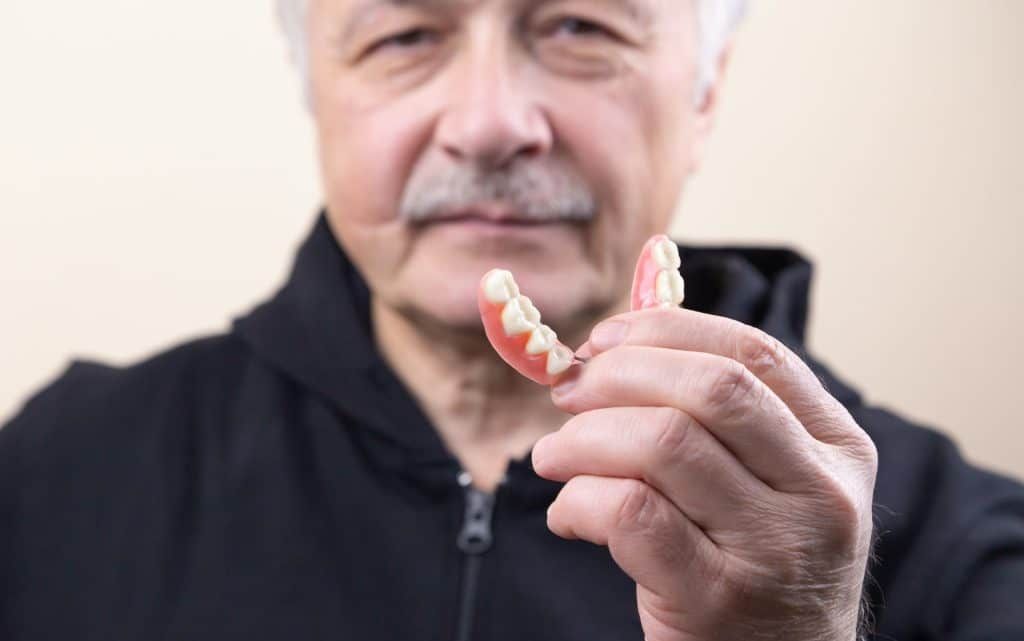Dentures: What Are They Made of and How They Look Like
Dr. Mitul Patel • September 28, 2023

There’s no denying that a striking smile can light up a room. But what happens when you lose some natural teeth due to gum disease, tooth decay, or injury? Here’s where dentures come in.
This informative blog post will answer various intriguing questions like, “What are dentures? What are they made of? What do they look like? How do they work?”
Dentures are removable artificial replacements for missing teeth and the tissues surrounding them. They are essential for individuals who have lost their natural teeth due to gum disease, tooth decay, or injuries.
Different types of dentures include:
Today’s dentures incorporate a variety of materials, each critical for different aspects of the denture’s structure and functionality. Let’s delve into these materials in more depth:
Contrary to popular belief, modern dentures look remarkably like natural teeth. The aim of dentures—be they traditional dentures, conventional dentures, or implant-supported dentures—is to be indistinguishable from real teeth. The artificial teeth are meticulously crafted and placed into the denture bases, producing a natural-looking result.
Dentures even simulate the natural gum color, making them look even more like natural teeth, so there’s no need to feel self-conscious about wearing them.
Dentures work by fitting snugly over the gums replacing absent teeth and gum tissues. Complete, also called “full” dentures, replace all teeth in the upper or lower jaw and rest on the gum that overlays the jawbone. Partial dentures replace only some teeth and are attached to remaining healthy teeth with metal clasps or precision devices.
Denture adhesives can also secure the fit, but a well-fitting denture may not need them. Most people can eat soft foods fairly quickly with time and muscle adaptation. With practice and patience, most denture wearers can master eating more challenging foods.
The process involves several steps and considerations, starting with a consultation and ending with creating a customized prosthetic. There are different types of dentures, such as partial, complete, and implant-supported, each designed to cater to specific dental needs.
First, dental professionals evaluate the condition of a person’s remaining natural teeth, gum tissues, and facial muscles. They will check for tooth decay, gum disease, bone loss, or other dental health issues that must be addressed beforehand. Regular dental checkups form an important part of the process.
Based on the dental care evaluation, the dental professional suggests a type of denture that suits the patient’s needs. This could range from partial dentures, designed to be supported by natural teeth, to complete dentures for those without any remaining teeth. Dental implants may also be suggested as a long-lasting alternative.
Dental professionals make an impression on the patient’s mouth using special materials. This impression is then used to make a precise mouth model, which serves as a blueprint for the dentures.
Dentures are typically made from several denture materials, including acrylic resin and, occasionally, porcelain for artificial teeth. An acrylic base, often colored to match natural gum tissue, holds the replacement teeth. Partial dentures might include a metal framework for extra support.
Fine-tuning is performed for the proper fit after the dentures are created. Ill-fitting dentures can cause discomfort and oral health problems. Achieving well-fitting dentures may need multiple visits.
Dental professionals educate denture wearers on proper care, cleaning, and storage of dentures. It’s advised to avoid harsh denture cleansers that can damage denture bases and to use approved denture cleaners. Denture adhesives might be recommended to improve the fit and stability of removable dentures.
Periodic dental visits are necessary to check the fit of dentures and monitor oral health.
Dentures can be an excellent treatment option for those missing some or all their natural teeth. They help restore appearances, improve speech and eating difficulties, and boost confidence. Dentures can also help maintain facial muscles that might otherwise sag due to missing teeth.
Long-lasting dentures can help you achieve a beautiful, full smile for years to come. If you’re considering this procedure as your dental care method, schedule an appointment with our team of professional dentists today. We can guide you through the entire process, making it as smooth as possible. Contact us today, and let’s get you that confident and lively smile again.
© Hello Family Dental. All Rights Reserved | An Art of Dental Marketing Website | Privacy Policy